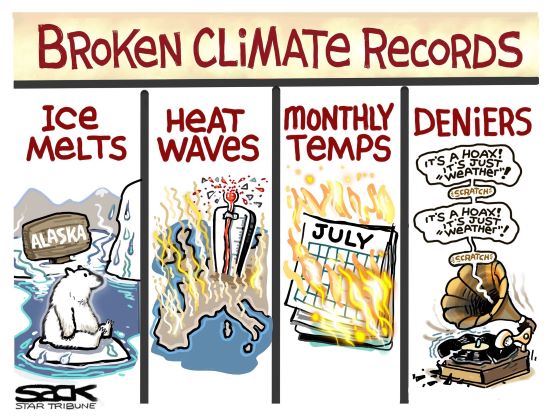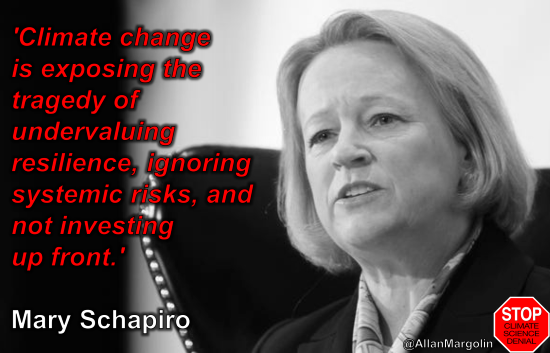2021 SkS Weekly Climate Change & Global Warming Digest #6
Posted on 7 February 2021 by John Hartz
Story of the Week... Editorial of the Week... Toon of the Week... Coming Soon on SkS... Climate Feedback Claim Review... SkS Week in Review... Poster of the Week...
Story of the Week...
Why call recent disasters ‘natural’ when they really aren’t?
Wildfires, storms, and viruses now are exacerbated by climate change. Perhaps we should call them what they are: disasters of our own making.
At a news conference in mid-August of last year, California’s governor, Gavin Newsom, announced that there were 367 “known” wildfires burning in the state. “I say ‘known’ fires,” Newsom said, “but the prospect of that number going up is very real.” A couple of days later the number did, in fact, increase, to 560. A few weeks after that, many of the blazes were still burning, and one—the Doe fire, north of Santa Rosa—had grown into the largest conflagration in California history. The smoke from the state was so bad that it veiled the sun in New England. By the time most of California’s flames had been put out in late November, at least 31 people had been killed and tens of thousands evacuated.
Even as more than 15,000 firefighters were battling the California wildfires, Hurricane Laura was bearing down on Louisiana. As it passed over the Gulf of Mexico, it strengthened at a near-record rate. In just 24 hours it zoomed from a Category 1 to a Category 4 storm. By the time it hit Cameron Parish, early in the morning of August 27, it was the fifth fiercest hurricane to make landfall in U.S. history. The storm caused at least 16 U.S. deaths and up to $12 billion in damages.
Twenty years ago, crises like the Doe fire and Hurricane Laura could have been described as “natural disasters.” Thanks to climate change, this is no longer the case. Right around the time of Newsom’s press conference, the mercury in Death Valley hit 130°F, the highest temperature ever reliably recorded on Earth. A hotter, drier California is much more likely to burst into flames. The Gulf too is heating up, with dangerous consequences. Hurricanes draw their energy from the warmth of the surface waters and so are becoming stronger and more apt to intensify. I’ve been reporting on climate change for almost two decades, and I’ve come to think that we need a new term to describe these events. Perhaps we should call them “man-made natural disasters.”
Click here to access the entire article as originally published on the National Geographic website.
Why call recent disasters ‘natural’ when they really aren’t? by Elizabeth Kolbert, The Big Idea, National Geographic, Feb 2, 2021 (March 2021 Print Edition)
Editorial of the Week...
The climate crisis still needs Congress
President Biden’s raft of executive actions put the US on a better path to lead the world, but legislation is still necessary.
President Biden came out swinging on climate change in his first two weeks in office. In a series of executive actions, he ensured the United States would rejoin the 2015 Paris climate accord, freeze new oil and gas leases on federal lands, invest in environmental justice programs, purchase American-made zero-emissions vehicles and clean sources of power, and impose rigorous standards for the buildings and infrastructure it funds in flood zones. But if the country is to meet the ambitious targets the new president has set to slash planet-warming emissions — and regain the credibility to nudge other nations to do the same — a dysfunctional Congress still needs to step up.
Biden campaigned on an agenda to make the electricity sector free of carbon emissions by 2035 and to bring the US economy to net-zero greenhouse gas emissions — absorbing through farms, forests, and technology as much as it pollutes — by 2050. Meeting those targets, and using the leverage it gives the United States to persuade other countries to do the same, is nothing short of a necessity if the world hopes to prevent economic and humanitarian catastrophe. But it’s also a tall order for an economy that still heavily relies on oil, coal, and natural gas.
Click here to access the entire Editorial as originally posted on the Boston Globe website.
The climate crisis still needs Congress, Opinion by Editorial Board, Boston Globe, Feb 6, 2021
Toon of the Week...

Hat tip to the Stop Climate Science Denial Facebook page.
Coming Soon on SkS...
- How long might the Arctic's 'Last Ice' area endure? (Peter Sinclair)
- Environmentalists' Climate Change Myths (Climate Adam)
- SkS New Research for Week #6 (Doug Bostrom)
- Investors flee Big Oil as portfolios get drilled (Karin Kirk)
- Scientists sceptical of new bat study linking climate change to Covid-19 emergence (Ayesha Tendon0
- 2021 SkS Weekly Climate Change & Global Warming News Roundup #7 (John Hartz)
- 2021 SkS Weekly Climate Change & Global Warming Digest #7 (John Hartz)
Climate Feedback Claim Review...
NOAA shows clear global warming trends over the past 58 years based on radiosonde data
CLAIM: “The 58 year net gain of global temperature is zero. We are simply in a cyclical, normal ebb and flow of temperature.”
VERDICT: ![]()
SOURCE: Facebook users, Facebook, 29 Jan 2021
KEY TAKE AWAY: Clear global warming trends of Earth’s ocean, land, lower and atmosphere have been observed over the past 58 years as well as over longer time periods. Radiosondes are instruments used by NOAA to collect temperature data in Earth’s troposphere, the lowest region of the atmosphere that extends from the surface to about 6 miles high. Radiosonde and satellite data from 1958 to 2019 demonstrate global warming in the lower troposphere.
Click here to access the detailed analysis of this claim by Stephen Po-Chedley, Postdoctoral Research Fellow, Lawrence Livermore National Laboratory.
NOAA shows clear global warming trends over the past 58 years based on radiosonde data, Edited by Nikki Forrester, Claim Reviews, Climate Feedback, Feb 5, 2021
SkS Week in Review...
- Sun: 2021 SkS Weekly Climate Change & Global Warming Digest #5 by John Hartz (SkS Original)
- Mon: A Climate Bet Impossible to Lose by Rob Honeycutt (SkS Original)
- Tue: Next self-paced run of Denial101x starts on February 9 by BaerbelW (SkS Original)
- Wed: Skeptical Science New Research for Week #5, 2021 by Doug Bostrom (SkS Original)
- Thur: Biden's climate executive orders are a mini-Green New Deal by Dana Nuccitelli (Yale Climate Connections Repost)
- Fri: Deadlines loom for Capitol Hill action on Trump-era climate issues by Gary Yohe, Henry Jacoby, Richard Richels & Benjamin Santer (Yale Climate Connections Repost)
- Sat: 2021 SkS Weekly Climate Change & Global Warming News Roundup #6 by John Hartz (SkS Original)
Poster of the Week...

Mary Lovelace Schapiro served as the 29th Chair of the U.S. Securities and Exchange Commission. She was appointed by President Barack Obama, unanimously confirmed by the U.S. Senate, and assumed the Chairship on January 27, 2009. She is the first woman to be the permanent Chair of the SEC. Wikipedia































 Arguments
Arguments






























Certainly the motive for such a change in language is laudable, but the above proposal to rename "natural disasters" just doesn't resonate with me, an old guy with a degree in conservation of natural resources from a major university.
I prefer the use of pronouns than to try to artificially revise language using artificial "new-speak".
The below general definition for "natural disaster" as used in the scientific community remains valid in my world. One must also realize that "disaster" part of the phrase is related to the has nothing to do with the state of physical earth processes without humans, but only the fact that humans (or perhaps other species) are impacted makes it a "disaster":
Of course, some "natural disasters" have been caused by - or made worse for humans - for centuries, long before AGW/CC. Consider dam failures, landslides, and wildfires caused by arson or accident, and they are still called natural disasters.
Xulonn:
While I can appreciate your point that this use of "natural" has a long history, I think part of the idea of changing the term likely comes from the common "skeptical" argument that humans are not affecting climate because the changes are "natural" - i.e., calling it "natural" suddenly takes humans out of the equation.
If you look at the Arguments list here at Skeptical Science (View all Arguments, in the sidebar near the bottom of the thermometer, or with this link: https://skepticalscience.com/argument.php), the word "natural shows up there a lot.